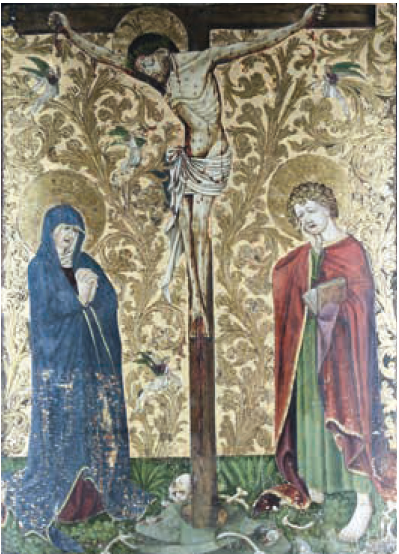Text by Liselore Tissen
The Crucifixion (ca.1425) of the Master of the Lamentation of Christ in Lindau (which is currently part or the collection of Museum Catharijneconvent) was in a bad condition in the museum depot for decades. Its paint was obscured with dirt and yellowed varnish. Furthermore, it contained many discolorations, darkened retouches and overpaints. The work has been made presentable by conservator Caroline van der Elst for the Body Language exhibition (autumn 2020). It was cleaned to some extent, yet, the restoration is not complete and will continue in 2021.
The biggest dilemma we are currently facing during the restoration process is the background: Mary, the crucified Christ and John are depicted against a dark blue background, provided with golden tendrils. The first investigation, however, showed that this background originally should have been golden: golden shining tendrils on a matte gold field (the matte gold was done in "tremolierung", small scales, applied with a gouge). The blue azurite layer that remains visible today is old, but not original. In the planned restoration, we will have to decide if the blue should be removed and return to the artist's original intention, or to keep the layer and continue showing this part of the restoration history. In collaboration with Leiden University and TU Delft, a 3D scan of the painting will be made with which we can reconstruct the background, so that we can get an idea of the original intention of the artist. It provides us with essential insights about the material characteristics of the work that are important for making fundamental decisions about the steps to be taken in the treatment (especially with regard to background in relief).

Master of the Lamentation of Christ in Lindau, The Crucifixion, ca. 1425. Tempera on panel, 125 × 89 cm, Museum Catharijneconvent – Current state
In order to be able to make good quality scans we have decided to work together with the specialists of Factum Arte (a well-known foundation that specializes in scanning and reproducing cultural heritage objects). They will travel to the Netherlands with their Lucida scanner to participate in this project and share their knowledge and insights. This research, the approach and collaboration and the specialism of the researchers from Madrid is unique. For this reason, Utrecht University together with the LDE Centre for Global Heritage and Development will organize a seminar in which we offer a unique insight into 3D technology (both scanning and reconstruction) of Factum Arte, the role of the museum and the artwork and the moral and ethical issues involved in scanning and restoring the panel. Furthermore, based on the scans and both the digital and the 3D printed reconstruction, the team consisting of art historian Sanne Frequin (UU), curator Micha Leeflang (Museum Catharijneconvent), restorer Caroline van der Elst, Liselore Tissen (TU Delft, Leiden University) and Willemijn Elkhuizen (TU Delft) will decide how the panel will be restored. The scanning will be decisive in the way both its material and immaterial qualities will be restored and conserved.

Digital photo reconstruction where the azurite layer was removed and a golden background was added - Pieter Geelen
The seminar will take place on July 8th 17.00-19.00 CET and will take place in the auditorium of Museum Catharijneconvent. On site we can invite up to 30 people, but the seminar will also be broadcasted live at a high quality. We invite our online participants to join the discussions by participating in our live chat. To join our online session, please send your name and email address to: s.frequin@uu.nl before July 5, 2021.
